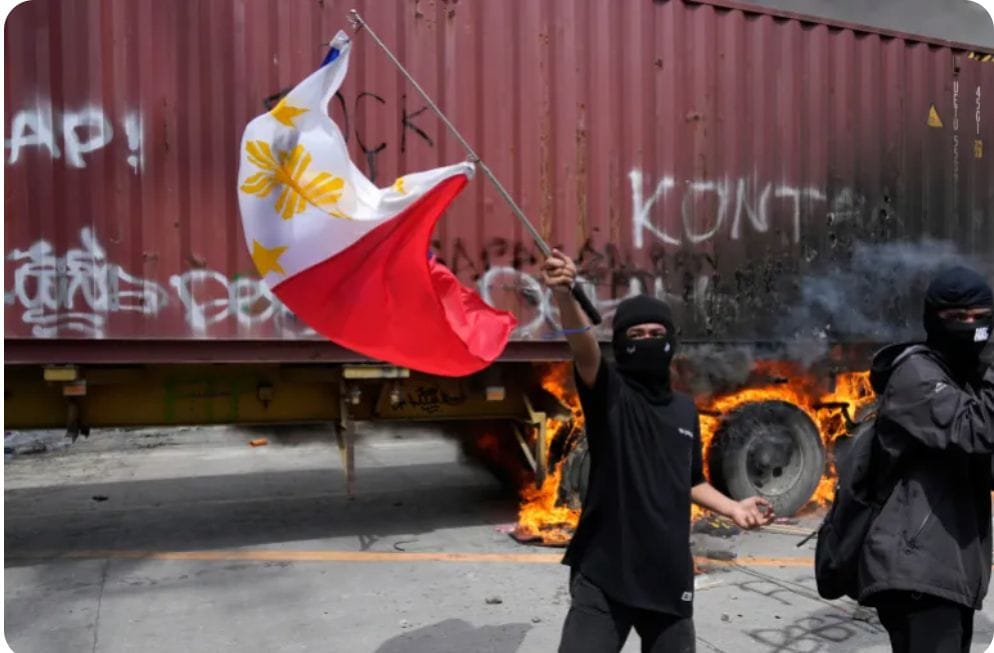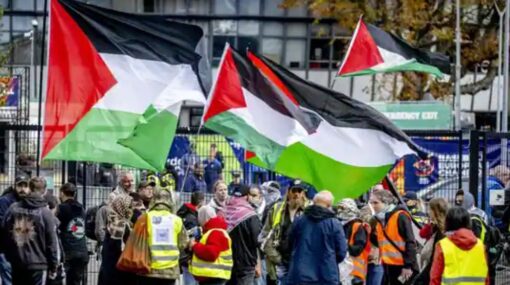Anti-corruption unrest erupted in Manila on Sunday as thousands of citizens took to the streets demanding accountability over billions of pesos allegedly mismanaged in flood-control projects.
Demonstrators called for transparency and justice, highlighting systemic graft and government negligence that has fueled widespread frustration across the Philippines.
Organizers reported that more than 13,000 people gathered at Luneta Park by mid-morning, waving Philippine flags and carrying placards that read slogans such as “no more corruption” and “Justice for our future.”
Many protesters highlighted the misuse of funds for so-called “ghost projects,” which were intended to mitigate flooding but have reportedly been exploited for personal enrichment.
“I feel bad that we wallow in poverty while our taxes feed luxury lifestyles,” said Althea Trinidad, a university student leading one of the protest groups. “We demand a shift to a system where people are no longer abused, and we want these projects fully accounted for.” Her statement encapsulated the anger that has fueled the ongoing anti-corruption unrest sweeping the nation.
The protest coincided with heightened scrutiny over the government’s handling of flood-control initiatives. President Ferdinand Marcos Jr. previously acknowledged anomalies in 9,855 projects worth more than 545 billion pesos ($9.5 billion), prompting him to establish an independent investigative commission.
These revelations intensified public outrage and have been a primary catalyst for the widespread anti-corruption unrest seen in Manila’s streets.
Adding to the tension, a wealthy construction couple reportedly awarded flood-control contracts have come under fire. Critics noted the luxurious vehicles owned by the couple, suggesting a stark contrast between public suffering and private opulence. Social media amplified these claims, fueling online discussions that spilled into physical demonstrations.
The protests were largely organized by Christian churches of multiple denominations, demonstrating the historical role of religious institutions in mobilizing civil society.
Analysts note that the timing of the protest — September 21, coinciding with the anniversary of martial law under former President Ferdinand Marcos Sr. — symbolically linked past struggles for justice to contemporary demands, lending additional weight to the ongoing anti-corruption unrest.
Police and military units were on high alert as organizers anticipated potential clashes. While authorities encouraged peaceful demonstrations, some isolated incidents of confrontations between security personnel and protesters occurred, resulting in minor injuries and the burning of several vehicles.
Despite this, the overarching message of the rally remained clear: Filipinos are unwilling to tolerate corruption at any level of governance.
“The army is on red alert, but peaceful expression is a citizen’s right,” President Marcos emphasized, underscoring the government’s recognition of public discontent. Nevertheless, the scale and intensity of the protests reflect the deep-seated grievances fueling the current wave of anti-corruption unrest.
Students and young professionals formed a significant portion of the demonstrators, highlighting the growing engagement of younger generations in civic activism. Aly Villahermosa, a nursing student, lamented the lack of resources for essential services like healthcare, questioning why budgets exist for ghost projects but not for basic public welfare.
Her sentiments resonate across the crowd, reinforcing the narrative that the misallocation of funds is at the heart of the anti-corruption unrest gripping Manila.
Observers point out that the Philippine protests echo wider regional trends. Southeast Asia has recently witnessed significant civil mobilization over issues including police brutality, inflation, and parliamentary wages.
While contexts differ, the common thread of challenging systemic abuses links Manila’s anti-corruption unrest to broader movements in the region, demonstrating an evolving pattern of civic engagement and public accountability.
The Philippine protests also sparked discussions about long-term reforms. Demonstrators called on the government to institute transparent procurement processes, rigorous audits, and swift legal action against those implicated in fraudulent schemes.
The ongoing anti-corruption unrest is not solely a response to isolated incidents but represents a demand for structural transformation in governance and accountability mechanisms.
Civil society organizations played a central role in mobilizing the protest, coordinating logistics, and raising awareness online. Social media became a vital tool for organizing marches, spreading information about government corruption, and amplifying public demands.
Activists emphasized that the ongoing anti-corruption unrest is part of a broader struggle for civic empowerment and responsible governance.
Meanwhile, international observers have highlighted the protests as a sign of democratic resilience. They note that citizens exercising their right to assemble, even amid challenges such as pandemic recovery and economic instability, reinforces the Philippines’ ongoing commitment to participatory governance.
This perspective situates Manila’s anti-corruption unrest within a global context, aligning domestic advocacy with broader democratic norms.
Reports from the front lines indicate that many protestors engaged in peaceful marches along key thoroughfares, including the historic EDSA highway, site of past “People Power” movements that transformed the country’s political landscape.
The deliberate choice of location reinforces the symbolic connection between past victories against authoritarianism and contemporary demands for transparency, emphasizing the enduring relevance of civic action in shaping public policy and challenging corruption.

As the day progressed, organizers reiterated calls for national reforms and accountability, demanding that all implicated officials face justice. The persistence of the protests, despite minor clashes with authorities, signals a determination to sustain the movement until tangible measures are implemented.
Analysts predict that the momentum of the anti-corruption unrest could influence upcoming elections and policy priorities, highlighting the intersection of civic activism and formal political processes.
Economic consequences have also emerged as a secondary dimension of the unrest. Investors and businesses have expressed concern over potential disruptions, while civil society advocates argue that long-term economic stability hinges on eradicating corruption.
This dual perspective underscores the complexity of the anti-corruption unrest, illustrating how governance issues reverberate across multiple sectors of society.
Ultimately, the protests in Manila represent both immediate grievances and a broader societal aspiration: to establish a transparent, accountable, and equitable government.
The scale, organization, and intensity of the demonstrations demonstrate that Filipinos are increasingly unwilling to accept mismanagement and impunity, framing the ongoing anticorruption unrest as a pivotal moment in the country’s democratic development.
The current wave of protests concludes a chapter in a series of ongoing civic actions addressing structural inequities in the Philippines.
By demanding rigorous oversight, accountability, and reform, citizens have amplified their voice and set the stage for systemic changes, with the anti-corruption unrest serving as both a warning and a guidepost for the government.
As Manila looks ahead, the challenge for policymakers lies in translating protester demands into meaningful, lasting reforms. Failure to address core grievances could fuel future mobilizations, while effective responses may reinforce public trust and democratic resilience.
In either case, the ongoing anticorruption unrest underscores the power of civic engagement in shaping a nation’s political and social trajectory.
The demonstrations, while rooted in specific corruption allegations, echo broader aspirations for justice, transparency, and accountability.
Manila’s streets have become a canvas for these civic demands, and the momentum generated by the protests may continue to influence Philippine governance for years to come.
The sustained presence of the anti-corruption unrest is a clear reminder that citizens are vigilant, active, and determined to protect the integrity of public institutions.


